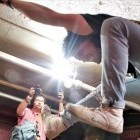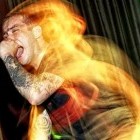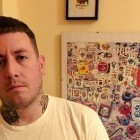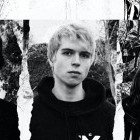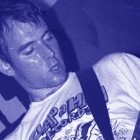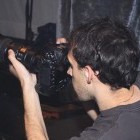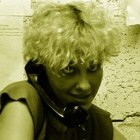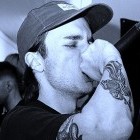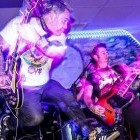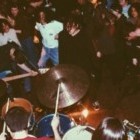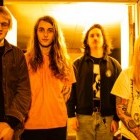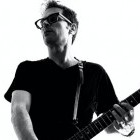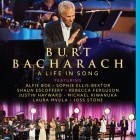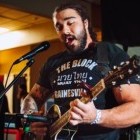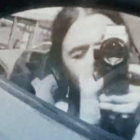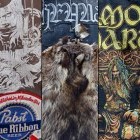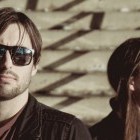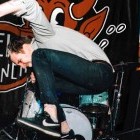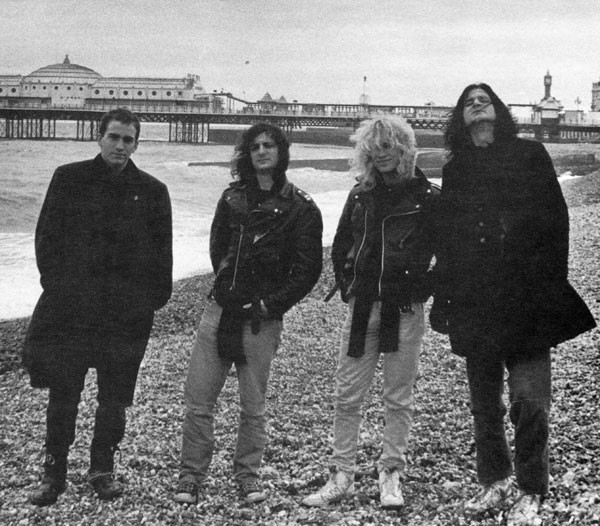
For the latest installment of his A Hardcore Conversation interview series, new No Echo contributor Anthony Allen Begnal chats with Government Issue guitarist Tom Lyle. There's some really insightful information about the DC hardcore scene of the '80s included, as well as Tom's thoughts on many of Government Issue's releases and songs.

You are Tom Lyle, guitar player from Government Issue, correct?
Yes. I started out as the bass player, though.
What made you want to play guitar when you were younger, and were you in any bands before Government Issue?
I never “wanted” to play. I came out of my mother’s womb with an out-of-tune Gibson SG in my tiny hands, ready to rock. But my earliest memories of playing in a band are not with me playing guitar. And not really bands, but in public school. I started out on wind instruments in elementary school. By the time I got into middle school I was playing percussion. Drums. By the time I left middle school I was mostly playing tympani in the high school band and orchestra. Usually you’d have to choose – band or orchestra. I played in both. They said yes to that because they needed me in both, because I knew how to tune a tympani. All through this boring musical education I was playing guitar at home. During middle school is when I started playing in what is usually considered a garage band, but we played mostly in the basement of our suburban wasteland homes. And we sucked.
How did you get into hardcore and punk to begin with?
We’re skipping ahead quite a bit, aren’t we? It doesn’t matter. I’ve heard about the so called Georgetown Punks, a small group of kids that were into it, but had never met them. But around 1980 I saw a Black Market Baby show. Even though they weren’t considered hardcore they were considered punk. And the hardcore kids were at this show. What blew my mind at that show was that there was no division between band and audience. The place wasn’t packed, it was in a college auditorium, and there weren’t enough people, so stage diving or any of that stuff wasn’t happening that much. But during their set it seemed like half the audience was on stage, and many of them would strut in a circle around the band, and just generally get into it, but never messing with the band or their equipment. So cool.
The real turning point for me was that after seeing DC hardcore bands in various locations, and that was cool, but I really never heard them on a good sound system. That was until there was a show at the 9:30 Club in the summer of ’81 with GI, Youth Brigade, and Minor Threat. I thought musicianship of these local “punk” bands was astounding. My mind was officially blown.
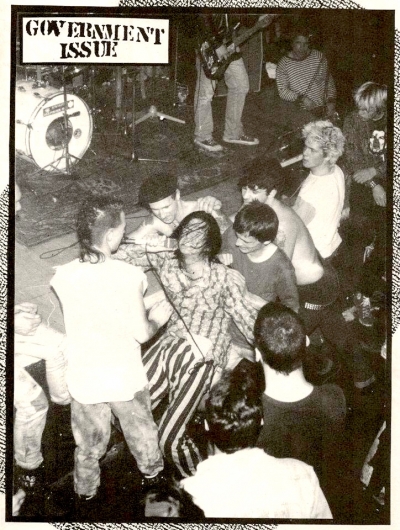
What did your parents think about all of this?
I had no relationship with my parents to speak of at this time in my life, other than talking to them on the phone every once in a while. And those conversations weren’t too deep. I lived in DC, they lived in New York. I would only call them if I got in trouble, or needed them in some other way. They were very self-involved, I had the feeling that the less I bothered them, the better. And the less they knew about what was really going on with me, the better.
Did they come to any Government Issue shows?
No. No way. The first time any family member saw one of our shows was not until 1987. My sister was living in the midwest, and so she came to a show in Chicago, we were playing The Metro with the Circle Jerks. Her comment afterwards was, “Holy shit! You are in a real band” with the emphasis on “real." Afterwards she said she was impressed, she had no idea.
You played bass initially in Government Issue, with Brian Baker from Minor Threat on guitar. How did you become a member of Government Issue and any thoughts or stories about playing bass with Brian?
My first show with GI was not with Brian on guitar. It was with the original Legless Bull lineup with me on bass. That night Brian was supposed to be on bass, he replaced originally bassist Brian Gay who left to go to college in Chicago – it was Halloween 1981. But Brian Baker was part of the DC contingent who went up to New York to see Fear play on Saturday Night Live. I was hanging out at the record store where singer John Stabb worked and noticed he was all bummed out that Brian had split to go to NY. I said “I know all your songs, I’ll play bass tonight," and I did. Which kind of served as an audition, because guitarist John Barry was leaving the band soon, to live in Bulgaria with his diplomat dad. Stabb told me that Brian was going to stay on bass for now, and then switch to guitar and I should take over bass duties.
After that show he missed because of Fear, and I filled in, Brian only played one more show with GI as the bass player – a show in November of ’81 with TSOL at the 9:30 Club. A month later I was on bass with Brian on guitar. My first show was in December of ’81, you probably saw the flyer, with a cartoon of Brian Baker on it, at Market 5 Gallery in DC with Void and Deadline. Void ended up cancelling because one of their members was grounded. Both Deadline and Void still had members of their bands in high school. I’m pretty sure that Brian Baker was still in school, too. I’ll say this lots of times, that it amazes me the amount of talent that was playing in DC back then. Most of these bands were made up of kids. Minor Threat were literally minors!
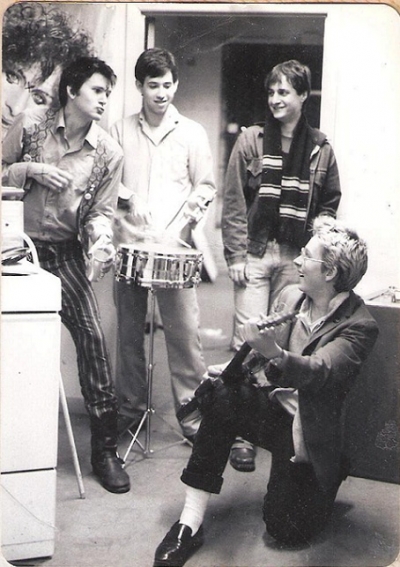
Was there any animosity when he left the band?
When Brian left to rejoin Minor Threat? Are you kidding? The entire scene hated them. It was obvious they were just doing it for the money. They were cashing in! I’m kidding, of course, I was totally psyched that Minor Threat were going to be a band again. Everyone I knew was very excited to be able to see and hear them again. When Brian called me on the phone to tell me, I asked him who he thought should be on guitar in GI now that he was going to join Minor Threat again. He said, “You are going to be on guitar!” I said, “Oh. OK." That was late March, early April 1982. June 25 we played our first real show with me on guitar and Mitch Parker on bass, at Wilson Center, no less. The video of that show is all over the place, there’s even a clip in the documentary Salad Days.
Why do you think Government Issue always kind of had a fluctuating lineup?
It was the same lineup Stabb, me, and Mark Alberstadt until 1986 when Marc, our drummer left the band. Until then it was always our bass players were couldn’t hang onto. They left for a different reason each time. From the outside looking in it seems like our lineup was constantly changing. But for us it didn’t seem that way, it was just bass players changing. Until ’86 that is. J. Robbins jointed sometime in ’85. Drummer Pete Moffett replaced Marc Alberstadt on drums, with about 6 months or so of drummer Sean Saley in there between the two.
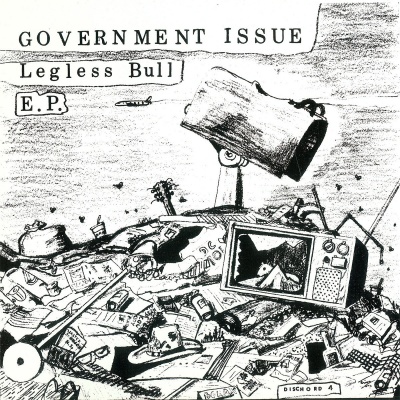
Was there a reason Government Issue didn’t continue to be on Dischord Records after Legless Bull?
We went into the studio with Ian in November of ’82 to record Boycott Stabb. We assumed that would be on Dischord. But Minor Threat were going on tour, and wanted to release their Out of Step record before they left. We didn’t want to wait to have Boycott Stabb come out until after they returned back from tour, so we asked our friend Derrick Hsu who had started Fountain of Youth Records. They had a deal with the distributor Dutch East India in New York, who was really the record company because they funded it. Dischord was still a rather small record company back then. Dutch East said we could release records whenever we wanted, which sounded cool to us, for sure.
For a couple records, Government Issue had sort of an almost metal sound yet you guys somehow avoided the backlash most punk and hardcore bands got for doing that sort of thing. Why do you think that is?
I guess you’re talking about our next record, Joy Ride. It’s definitely slower than Boycott. But I don’t think it sounds like metal, and I guess that’s why there was no “backlash," as you said. And, you said “almost” metal. I don’t remember anyone accusing of us sounding like a metal band. There was no mating call vocals or flashy guitar solos. Maybe because of the guitar sound? Because it wasn’t fast as Boycott Stabb, I guess? We were super adrenal-ized for that one [laughs].
I remember a Government Issue interview in Flipside at that time where one of you guys said something about you guys being a hard rock band as opposed to a hardcore punk band. Plus “Time to Escape” (off of Joy Ride) would not sound out of place on a Motörhead record. Thoughts?
Yes, I can see how Mark Alberstadt would say that. He might have been joking. We also might have just finished writing one of our songs that was influenced by hard rock. You also have to remember that we were Government Issue, and John Stabb was in our band! Have you heard the Legless Bull EP on Dischord? Lots of the tracks on that might be called funny by some, such as the lyrics to "Rock & Roll Bullshit" and "Sheer Terror," too, which we continued to play, as sort of a joke.
“Destroying things, are easy to do,
But me, I just like scaring you,
You wonder what goes on, in my head,
Don't try to find out, or you'll be dead!”
I hope anyone didn't take this seriously! I hope that no one thought that Stabb was actually thinking of murdering anyone. Lots of music, especially music from the '70s we thought was hilarious. And me and Marc, our drummer, would come up with these riffs that we borrowed from bands back then that we thought were ridiculous. And some of the ideas were ridiculous. The 5th untitled (GI) record we originally planned to be our concept album! We wanted to poke fun at the whole album length double fold out Hipgnosis (Hipgnosis are best known as the designers of Pink Floyd and assorted prog rock album covers) cover art silliness of it all. But when we told some people we were planning that they didn't think it was as funny as we did, so we dropped the idea. But some of the songs beginnings and ends were written as segues to the other tracks, and at least I can still hear that on the tracks from that album. But I would probably have to point out what to listen for.
I wrote the music to "Time to Escape." I thought that was a cool guitar riff, that's all. It's also in a cool sounding key. In the movie This Is Spinal Tap when Nigel Tufnel is at the piano and says "D Minor is the saddest key," well, I think that either F-Sharp or D-flat are the heaviest sounding keys. "Time to Escape" was written in D-Flat. And when you're playing in D-Flat and you hit the open high E and B strings it is a tri-tone. The "Black Sabbath interval"!
Wait, you mean to tell me Stabb wasn’t literally adding notches to his crotch? Where did that metal influence come from?
Satan.
What was the story with you guys recording different versions of “Sheer Terror” a few times and why did you stop and not keep doing it for your whole discography?
I wish I had a more interesting answer to the question of why we stopped recording versions of “Sheer Terror." As I said before, we thought it was a funny song, and funny that we kept on recording versions of the song. After we recorded the version that was an out-take from The Fun Just Never Ends we just stopped recording versions of it. It wasn’t a conscious decision. We just stopped. Once in a while we’d play it live. In fact, it was the last song we ever played, at the end of our last show in June of ‘89. I was into the song because it was excuse for me to feedback and make lots of noise. It probably wasn’t much fun for anyone else in the band, though, being that it’s a two note song until the freak-out part.
Don’t take this the wrong way because I’ve always loved your playing, but why weren’t there any kind of traditional metal/hard rock solos on Government Issue records?
Because I considered guitar solos nothing more than macho guitar masturbation. After Hendrix and the other very creative guitar heroes of the '60s had their say, it was all Eddie Van Halen technical flash. What could a guitar solo add to the music we were writing back then? Nothing. Shit, we were still a hardcore band – verse, chorus, verse, chorus, end. 1. 2. 1, 2, 3, 4. OK, I played a few solos, but I think you might be able to count them on one hand. Even Lyle Preslar played a solo here and there (in Minor Threat). Like him, I tried only to add them when they’d really fit the song. Which means most of the time no solo.
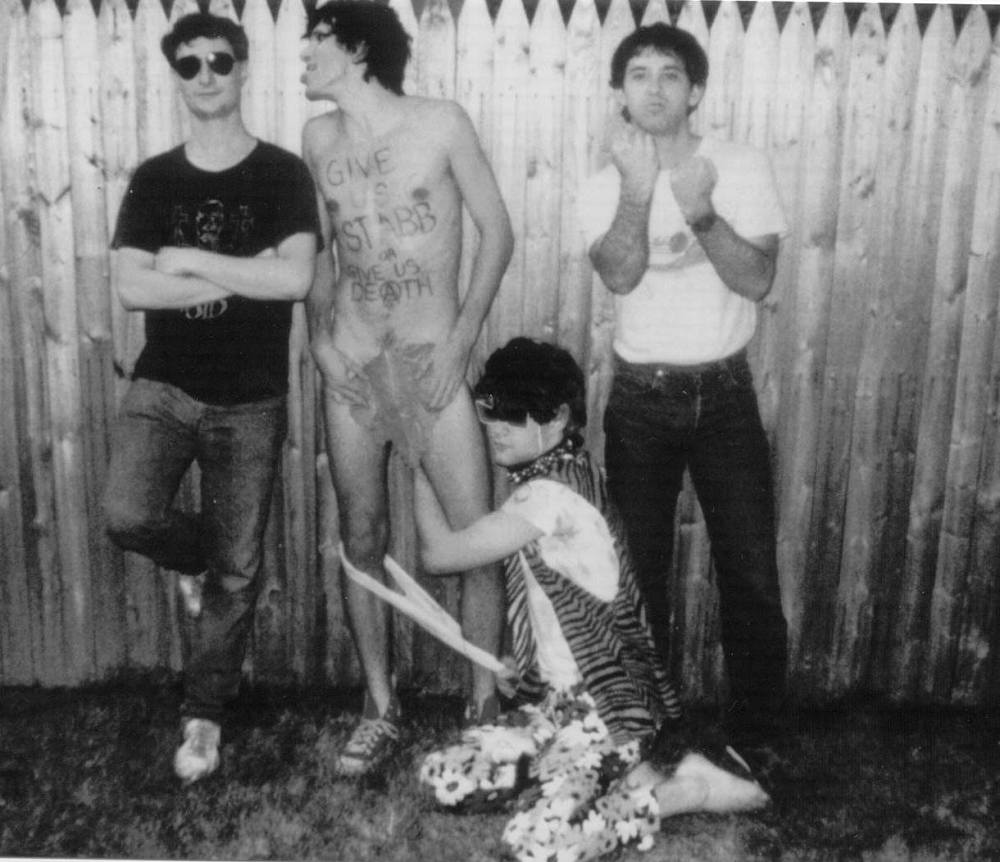
What was the writing process in Government Issue?
We prayed to Satan, and meditated around a bonfire we started from scraps of wood from destroyed churches, but that was after we sacrificed a goat, of course. Sorry. Up until Crash, for the most part I wrote the music, and Stabb wrote the lyrics. But not always. For most of the material we’d tweak both the lyrics and music in rehearsal, but that’s about all it was. Down and dirty. During the Joy Ride period bassist Mike Fellows contributed important ideas. The tracks “Understand” and “Familiar” would have been very different without his contributions. They might not even have existed. If you squint your ears you can even hear a bit of Rites of Spring in those tunes. Which isn’t surprising since that’s the band he was in right after GI.
Do you know the story behind the Boycott Stabb cover art graffiti? Was someone really somehow anti-Stabb at the time?
It was Stabb’s ex-girlfriend who drew it on a construction site’s wooden fence across the street from the record store Stabb worked at in Georgetown. I took a picture of it with a 35 millimeter Minolta camera that I “borrowed” from my dad about 4 years earlier. I did the cover art for the records until our The Fun Just Never Ends LP. But that one and the 5th s/t album were still my photos, but the albums were laid out by a graphic artist friend of ours. The earlier records, Make An Effort, Boycott..., Give Us Stabb…, were all done in my bedroom. You and Crash were designed by J. Robbins, our bassist on those records.
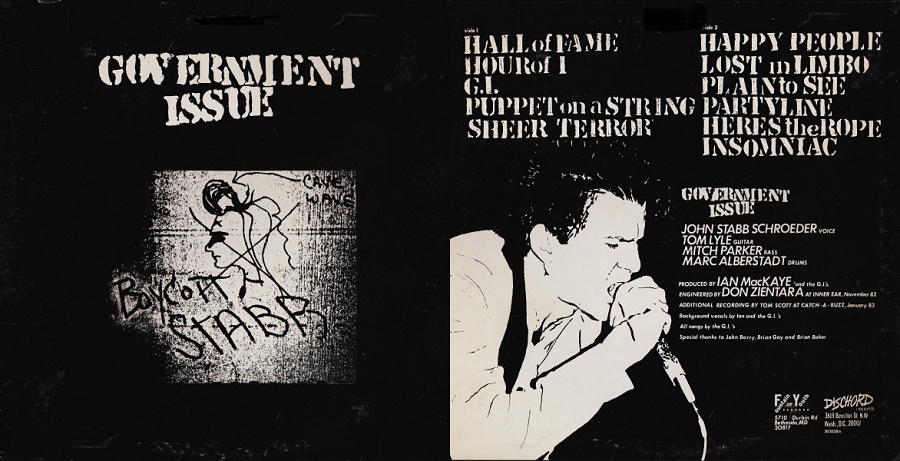
You recorded part of The Fun Just Never Ends at CBGB. How’d that happen and do you have any good memories/stories from that session?
We recorded the basic tracks for a few songs at CBGB during the day with no audience there. They owned a 16-track 2-inch tape machine. And then we took those tracks into the studio and finished them. “Mad at Myself”, “Vanity Fare," “Written Word," and the bonus cut of “Sheer Terror” that first appeared on the CD version. It was intense, though. The CBGB’s “studio” session was recorded at the beginning of a US tour. We parked our van in a parking lot across from CB’s and since our gear was in the van, 2 of our roadies and Stabb slept in it. People thought we, were insane. Or maybe stupid. That neighborhood was very sketchy back then. Very. It’s been gentrified since then, but above CBGBs there was a homeless shelter, and that neighborhood was not a place you’d want to spend the night in a parking lot. But they survived the night. And we got a good tape out of it.
I see in the credits that Brian Baker returned to Government Issue as co-producer on that record and Joy Ride. What did he bring to the table as a producer?
Nothing. Absolutely nothing. He was there for the free Coca-Colas and food. That’s it. That’s not true, of course. We were friends, that’s all. He and I had the same ideas about what we wanted things to sound like. Or didn’t want it to sound like. And he’d make suggestions, sometimes. Like a producer. It was his idea to put the handclaps in “These Boots Are Made for Walking”.
_1983.jpg)
Where do you stand on the Faith/Void LP? Are you a Faith guy or a Void guy? I know you guys covered a Faith song on The Fun Just Never Ends, so is it safe to say you’re a Faith guy?
I stand more on the side of that I wish Dischord put out separate releases instead of a split Faith/Void record. Those bands are so different from each other. From different areas of the DC metro area, and certainly different sounds. I love both of those bands so much, both of them epitomize how DC set itself apart from not every other scene in the US, but the world. Even though I have very little knowledge of what was going on in the rest of the world. Again, they were kids, and the quality of music that oozed from those bands is incredible. I was amazed when I first heard them, and I still am amazed when I listen to those bands’ recordings today.
Just because we covered a Faith song on The Fun Just Never Ends album doesn’t mean that we like The Faith more than Void, any more than it means that we like The Faith more than the Ramones. We just thought it would be cool to cover that tune when that album was being made. On the Live Bootleg Series on our Bandcamp page on the Marble Bar show in Baltimore March 20 1987 we cover two Void songs,”Organized Sports” and “Who Are You” and another Faith song besides “Trapped," “In the Black”. We also make up a song on the spot called “Sex with Satan," so I guess that makes us fans of the devil, doesn’t it?
I’ve always really admired your guitar sound. Can you tell us a little about how you achieved that awesome, warm, heavy sound you have?
I’ve always stood by the the fact that the player makes more of a difference than the equipment used. I used different guitars and different amps on the albums and live and yet I think it always sounds like me. Most of the time in the studio I used a guitar fitted with Dimarzio Super Distortion pickups, the guitar plugged into a Marshall 100 watt head with its master volume turned all the way up. On the records there’s usually an MXR stereo chorus added after the fact, during mix-down, turned up just a little, just until you hear it. It’s the same exact device that Ian used in those early Dischord records like Dag Nasty’s first 2 albums, plus Void, and the like. But I didn’t have it turned up nearly as much as he did with those bands. But that’s it as far as gear goes.
My sound has more to do with how I play. When playing chords I often only play the lower strings. I might only be playing two strings for the entire chord, maybe three. And I’ll always choose to play the lower note rather than the higher, sometimes even reaching my thumb around the neck to add a note on the low E string to the chord to heavy it up a bit. Or even the second lowest string if I’m feeling up to it. For example, most guitarists when playing a D Chord will have the D that’s equivalent to the open D, the 4th string as the lowest note. But I’ll often add an F-sharp with my thumb on the second fret of the E, or lowest string, and at the same time mute the highest notes of the chord. Shit like that.
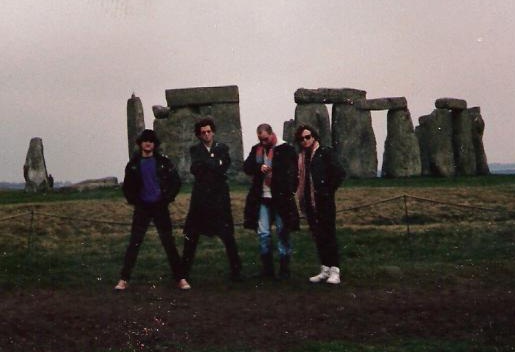
You’ve done some producing and mastering yourself over the years. What are some recordings that stand out to you and do you have any good or interesting stories from recording any of those sessions? What can you tell us about producing the Half Life Under the Knife 7”?
I’ve always had a great time producing bands. I don’t do as much of it now that I don’t live in the DC area. I guess it’s because they don’t trust me as much as the bands in DC do? Although I’ve produced a few bands that weren’t from DC, too. I loved working with Pittsburgh’s Half Life, they were so much fun. They were a band that was in it for the love of playing music more than anything else. I like the sound we got on the 7-inch Under the Knife EP, too, more than the full album, which I’m perfectly happy with, but the 7-inch came out sounding better from a sonic standpoint for some reason. The music on the album is just as good, maybe better because there are more tracks! I don’t know why the EP sounds better. Maybe the planets were aligned creating greater mojo, or it was the phase of the moon doing that.
Working with Black Market Baby was a dream come true. I’ve always wanted to work with them, for many reasons, and finally got my chance at the end of their career. You can hear some of those tracks on their compilation Coulda... Shoulda... Woulda - The Black Market Baby Collection, which I mastered, by the way. When I worked with Black Market Baby my goal was to get their classic sound like they had on their early singles, and maybe even improve it a little, and I think I came close. During the last decade or so I’ve been doing tons of mastering, and especially lots of re-mastering. I have a killer system to do this. Many times bands lose their masters, but my system, and my techniques, are good enough so I can use alternative sources, even vinyl. I can make a new master from a vinyl copy that they issued back in the day, and no one can tell, it ends up sounding like I used their ¼-inch master tape to make it. I’ve even had to master from cassette copies. It’s tougher, but I’ve done it.
After a while Government Issue’s sound changed from the standard hardcore to the metal influenced thing into a more melodic, rock kind of sound. What made that happen? And, do you have a personal favorite record or era of the band?
It didn’t happen because we consciously attempted to change our sound. We considered it growth more than anything else. We also wanted to incorporate different types of music that we liked. When I started out with GI we were a hardcore band, plain and simple. We were on a mission – to be hardcore band. We liked that. Those early days were awesome, I can’t stress that enough. It was music we were playing for our friends and our scene. But then as we started touring more and more, and I guess becoming better on our instruments, we were comfortable stretching out musically.
Any fellow guitar players or bass players you admired from the classic hardcore era?
Well, I told you already that back in the day Brian Baker and I were friends. We still are friends, but it’s very different when you’re a kid and you live in the same town. We don’t live in the same town anymore. And we’re not kids anymore [laughs]. But back then, we would spend some time together playing our guitars, and we would trade ideas with each other. And by ideas I mean ideas on guitar. And so it was great to spent time with such a great guitar player. I think it made me a better guitar player.
But those I just plain old admired were few and far between, only because I liked the music and the bands more than individual players. But there were a few that stuck out:
- Mike Hampton of The Faith. He wrote those guitar riffs and chord progressions along with Chris Bald. I assumed that Mike had classical guitar lessons as a kid, and just translated pieces of that to the tunes he wrote. Lots of guitarists do that. But Mike Hampton didn’t. He just thought that stuff up by himself. Amazing.
- Lyle Preslar of Minor Threat, was amazing to watch. I told you how I would play only hitting a few strings at a time when playing a chord? Lyle got his sound by playing all of the strings of a chord at the same time. Practically all at the exact same time. It gave the guitar such a dense sound on the first two EPs. And it was like that live, too.
- Robb Nunzio of Antidote plays the guitar in such a cool way. You might think, I mean that he’s all acrobatic and wild when he’s playing. He’s not. Quite the opposite. He has this cool as shit, no one can fuck with me posture when he’s playing. And his right hand has a kind of swagger while he strums the guitar. I can’t explain it any other way. Almost like a street-tough presence. Very New York.
- Of course there’s Bubba Dupree of Void, who has similarities to Jimi Hendrix when he plays. But, and I mean the following in the most complimentary way – Hendrix was a master at controlled feedback, but Bubba Dupree was a master at uncontrolled feedback. At the same time he was able to keep his cool and know exactly where he was in the song. Eventually the rest of the band would catch up to him in all that chaos. I’m lucky, I got to see Void play almost 20 times. Each show was radically different from each other. And so I got to hear him play in all these different situations where he was able to make sense of all the confusion on stage, all whilst feeding back, and looking good while he was doing it, too.
- Toni Young, who was in Red C I practically worshiped from afar. Even though I was closer to afar many times. She was the bass player in Red C, and later of ENB, who eventually changed their name to Dove. The hardcore scene was a very paternal organization, for the most part a white boys club. The DC scene did differ from other scenes, at least a little, because it did have more than a few bands that differed from the norm. More or less. Toni was an African-American woman who played in a band with an Asian vocalist. There were other bands in DC that had woman and non-white members, for sure. But here I’m talking about Toni Young. She was a great bass player, and I got to know her better because she went in the vans with Double-O and GI on our first out of town mini tour to New York and Boston in very early 1982. She was good friends with Eric L, the vocalist of Red C, and then Double O. She died in 1986 of pneumonia. Everyone I knew took that very hard. I still miss her.
- Mike Watt of Minutemen. Were the Minutemen even hardcore punk? In the strictest sense, no. But they were booked with hardcore bands on the same bill, and usually played to the hardcore kids at their shows. But the Minutemen’s music certainly wasn’t hardcore. Mike Watt is a musician. I think he could play in any band he wanted, regardless genre. Such a great rock bassist, that’s all. The only person on this list who I never met. Or at least I don’t remember ever meeting him.
There were others of course. But I don’t think it’s a surprise that any of these are listed, do you?
Do you still play guitar and what’s become of those Marshalls that you had/have in those classic Government Issue pics and videos?
I play guitar. But at home. All my Marshalls are gone, except for one head and one cabinet. I kept my favorite, the early '80s 100 watt JCM Marshall head that I recorded the You and Crash albums with, and one 4 by 12-inch slant Marshall speaker cabinet from the later '80s.
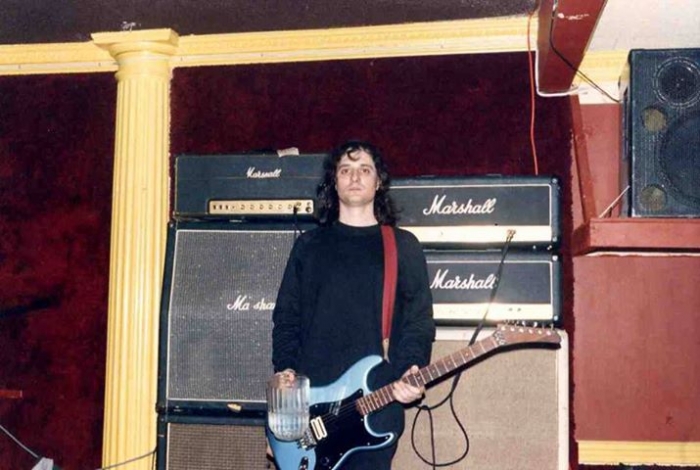
What else are you currently up to?
I’m the senior editor at a high-end audio magazine. So I listen to lots of music, mostly on vinyl. And that killer system I have because of the magazine allows me to have a killer system for play-back when I’m mastering, too. All music, all the time.
And, anything you wanna add or websites etc?
DrStrange.com sells our physical vinyl LPs & CDs. You can also download the stuff Dr. Strange sells on Amazon, iTunes, and other sites for the material on the CDs that Dr. Strange carries. Personally, I like CDs and records more than downloads, but to each his or her own.
Govt-issue.bandcamp.com has the Live Bootleg Series and more, so you can download tons of live shows and other things we’ve done. All except what Dr. Strange sells. ITunes has some of the material on the Live Bootleg Series, but has better sound quality and is much less expensive on our Bandcamp page. My Instagram account is @tomlyle807 [No Echo interviewed Tom for the site's Record Collector series back in 2017].
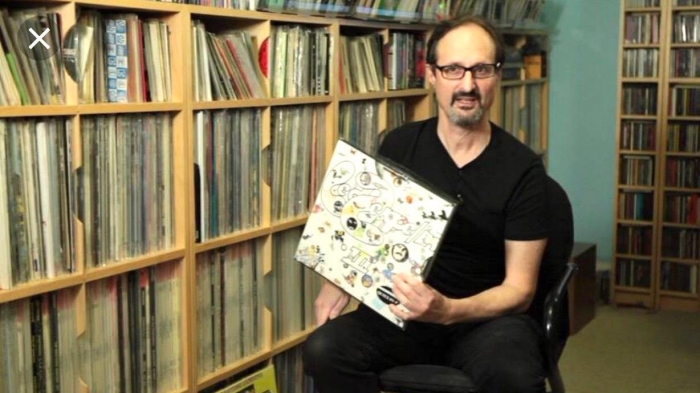
***
If you're shopping for vinyl, CD, and cassette hardcore titles, head to No Echo's partner store, Reverb LP, to see what they have available. Every purchase you make helps No Echo with site costs.
Tagged: a hardcore conversation, government issue

